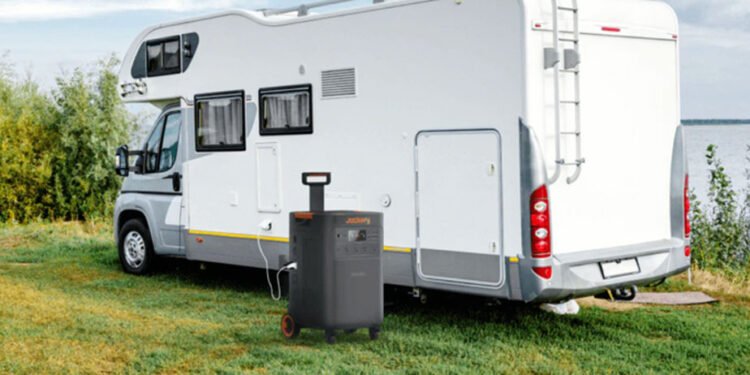Picture this: You’re driving across Canada. Endless skies stretch above you; highways wind out in front. One day you stop by a quiet Alberta lake. The next morning, you wake up to peaks in the Rockies. A few days later, you might end an evening watching the sunset on the Atlantic Coast. An RV turns the road into home—you’ve got your own bed, your favorite meals, and a space that’s truly yours, no matter how far from city limits you get. That’s the beauty of RV travel. It’s about freedom, comfort, and bringing everything that matters along for the ride. No hotel check-ins. Forget the overpriced meals, tiny soaps, or generic coffee. Instead, you cook what you love. You sleep where you choose. You wake up to views no hotel could ever offer.
But here’s the thing: True freedom on the road depends on reliable power. Without a portable power station, that cozy lakeside dinner turns into fumbling for flashlights when the sun sets. You’ll say goodbye to background music. A night under the stars suddenly feels less romantic. No power means a dead phone, a non-functional fridge, and that fresh BC salmon or Ontario berries you stocked up on spoiling in hours.
Don’t worry! This guide walks you through every essential preparation for your dream cross-Canada RV adventure across Canada. We highlight the must-have gear to keep you safe, comfortable, and powered up, even in remote spots like the Yukon or Newfoundland. Now, you can focus on the open road, the scenery, and the freedom of travel.
Importance of Proper Preparation for an RV Road Trip
A trip in an RV through Canada is more than packing a sleeping bag and some snacks into your vehicle. To truly enjoy the open road, plan smart and think ahead. A well-prepared RV allows you to stay safe, comfortable, and self-sufficient, so you can camp wherever the road takes you, rather than just wherever a power hook-up exists.
When you plan carefully, you avoid overloading your RV with clutter. You’ll also find what you need exactly when you need it. Proper preparation and forethought will bring a feeling of calm so you can really relax, live in the moment and enjoy driving. You won’t make a last-minute detour to some expensive roadside mart to pick up a forgotten necessity.
Forget something essential? You’ll feel it fast—and it’s never fun. Nobody wants to run out of fresh water at a remote campsite, lose Wi-Fi mid-work (a nightmare for digital nomads), or have their RV fridge die because they underestimated their power needs. Spending a chilly night without a heating source is difficult. Observing all of your fresh food go bad due to the power station running out is worse.
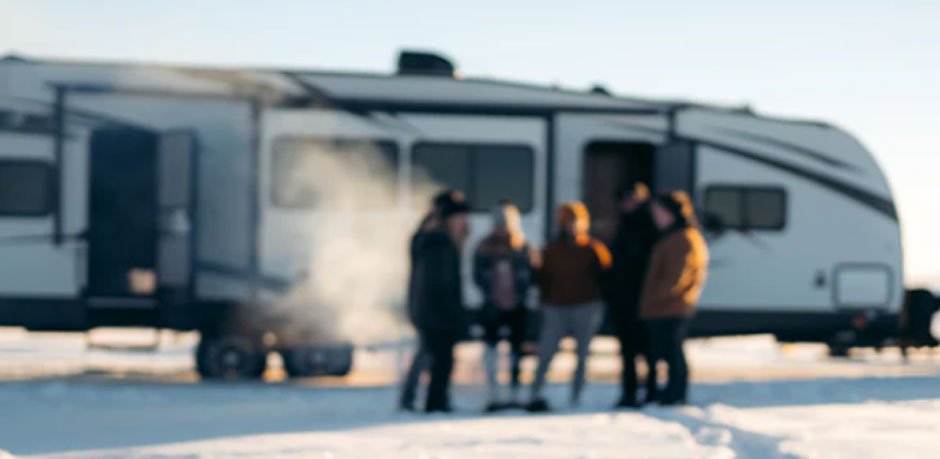
Imagine what’s ahead. Would you like to cook a fish meal by the lakeshore? Make sure to bring a grill and some seasoning, like garlic, dill, or lemon pepper. Will you witness the spectacular Northern Lights of the Yukon? Make sure to bring power to your heater and lights—those sub-zero nights mean you’ll need reliable warmth to stay comfortable. To make trips a little easier, consider adding a solar generator for RV travel. Being on the road doesn’t have to mean giving up the comforts you love—warm meals, a charged phone, or a cozy night’s sleep.
In the end, proper preparation is more than just being organized. That’s why a well-planned RV trip takes out the stressful guesswork. It can be the smooth, unforgettable adventure you’ll talk about for years.
How to plan an RV trip : A Checklist
The key to a successful RV trip lies in careful planning. A checklist helps you cover all the basics without forgetting the details that make your trip smooth and enjoyable.
Essential RV Gear
Don’t wait until the last minute to think about your RV gear. Having the right stuff for Canada’s weather and terrain is what turns a good trip into a great one, even when you’re miles from the nearest town. Here’s what you need for essential RV gear.
- Driver’s License and Documents: Don’t forget to have the driver’s license, insurance documents, and roadside assistance documents.
- Spare Keys: Never let the lost keys be the reason you finish a trip early. Always have spare keys.
- Emergency Toolkit: Some of the most basic tools like a screwdriver, pliers, and some duct tape can be a lifesaver.
- Tire Tools: Carry a jack, wrench, and a tire repair kit. Flat tires are more common than you might expect, especially on Canada’s gravel backroads or rural highways.
- First Aid Kit: Remember that mosquitoes and black flies get fierce. You’ll see them especially near lakes or in northern forests from June to August. Seriously, don’t skip the bug spray and long-sleeve shirts.
- Fire Safety: Have a fire extinguisher in the vehicle to put out small fires that may occur while cooking as well as during campfire activities.
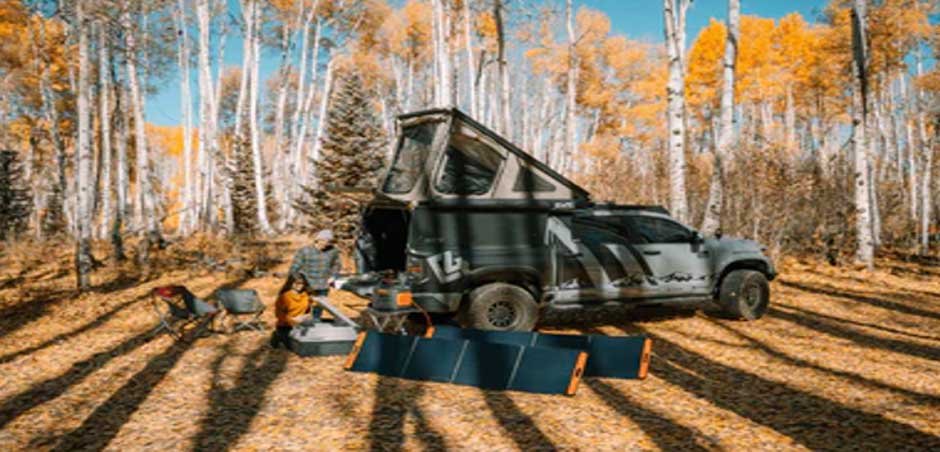 Food and Kitchen Gear
Food and Kitchen Gear
Cooking in your RV is part of the fun—and it saves money too. With the right setup, you’ll feel cozy at home.
- Cooking Stuff: Bring a frying pan, pot, cutting board, knives, and openers.
- Groceries: Stock up on shelf-stable staples like pasta, canned food, and condiments you actually use.
- Dining Stuff: Go with reusable plates, cups, and cutlery. It’s way better for the environment than disposables, plus you save some precious storage space in your RV.
- Cleaning Supplies: Bring dish soap, sponges, cloths, wet wipes, and garbage bags. These small items are lifesavers. They keep your RV from smelling like last night’s lake trout fry.
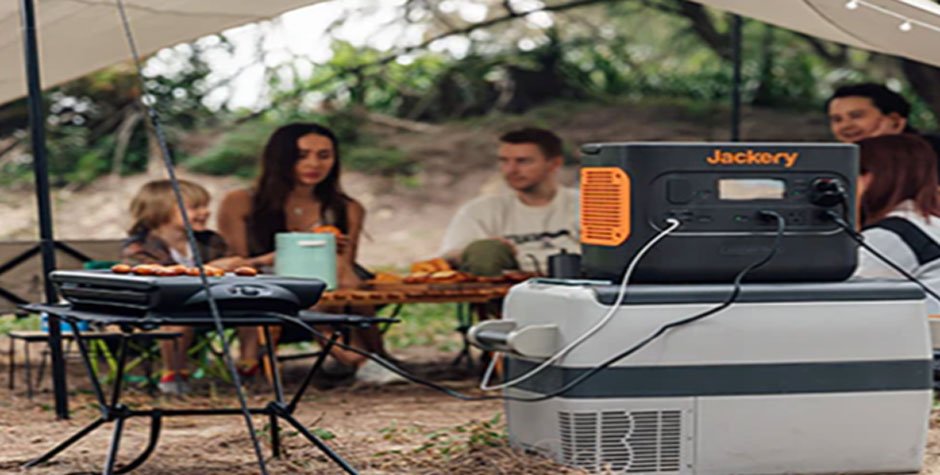
A well-stocked kitchen makes every road meal simple and enjoyable.
Clothing and Weather Prep
When getting ready for an RV trip in Canada, consider some variety. Weather can change quickly, from warm afternoons to chilly nights. You might wear a T-shirt at noon and need a jacket by evening, with nights dropping below 10°C even in summer.
- Layered Clothing: No need to bring the bulky winter coats. You’ll want a bunch of T-shirts, a couple of comfy hoodies or fleece sweaters, and a windproof jacket. This way, you can easily add or remove a layer.
- Rain Gear: You’ll want a good waterproof jacket, and some waterproof shoes or boots. You’ll want to stay dry when the cold drizzle of BC’s West Coast or sudden Prairie downpours roll in. Don’t be that person who hangs wet socks over the stove to dry.
- Warm Staples: You’ll need long underwear, thick wool socks and a toque for sitting around the fire. Summer nights are especially chilly in the mountains and northern areas. Don’t forget to bring them when you head to the mountains in the summer. You’ll be glad to have warm clothes —especially when sitting around a campfire.
- Easy Footwear: Bring along some slides or flip-flops. They’ll come in handy for quick visits to the shower house or just relaxing around the RV.
- Cozy Bedding: Skip the rental stuff. Bring your own sheets, some cozy blankets, and your favorite pillow. After a long day of driving or exploring, your bedding will be a familiar and welcome comfort.
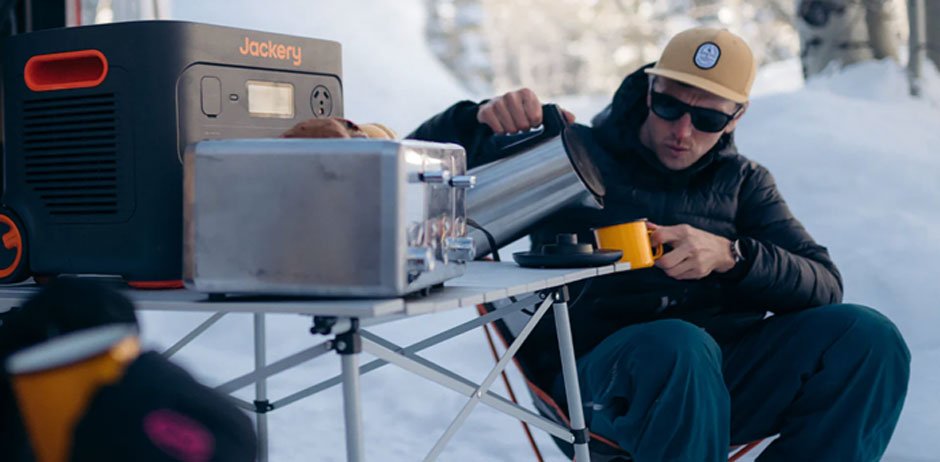
By packing smart, you’ll be ready for any weather in Canada.
Campsite and Outdoor Gear
Your campsite is where road life slows down. The right gear makes it relaxing and safe.
- Camp Chairs: Lightweight folding chairs are suitable for fireside evenings or stargazing. You can use them for fireside evenings, chilling by the lake, or just doing some serious stargazing.
- Bug Protection: Summertime traveling? Bug repellent is not optional, it’s essential. The mosquitoes and black flies are relentless, especially around the evening and early morning. Don’t let the biters ruin a peaceful evening.
- Entertainment: When the sun goes down, or if the weather turns to crud, you need a backup plan. You can pack a few books, e-reader, camera or a good, worn deck of cards. When you cross into the good wilderness, that Wi-Fi signal is going to disappear.
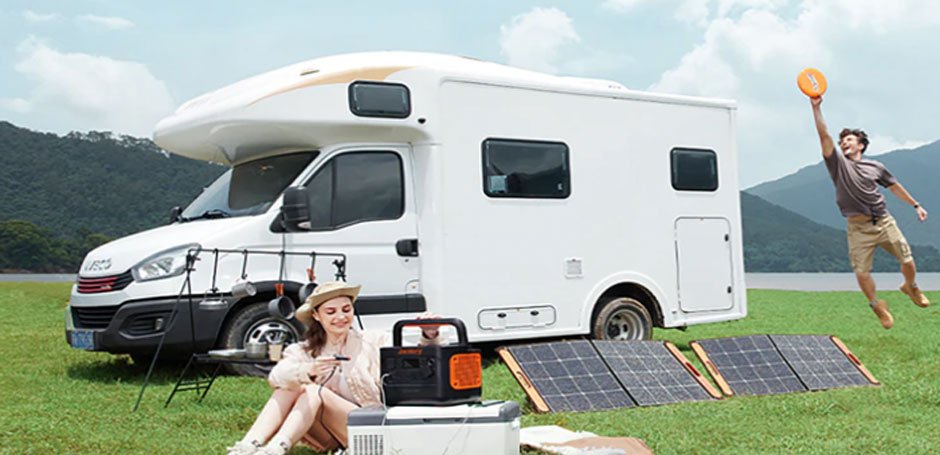
These items transform your campsite from a stopover into a cozy retreat. With the right balance of tech and offline activities, your downtime will be just as rewarding as the drive.
Power and Energy
On the road, energy is more than a convenience. It’s what keeps your trip running smoothly. From cooking dinner to heating the RV on a chilly night, reliable power makes all the difference.
- Extension Cords and Adapters: Campgrounds use different outlets, so bring the right connectors for flexibility.
- Solar Panels: A practical way to recharge when you’re off-grid for a few days.
- Extra Batteries: Batteries in devices such as flashlights, remotes, and head lamps always seem to run out when you need to use them the most.
- Portable Power Station: Great backup to power your fridge, heater, laptops, and cameras all at the same time.
For those who truly embrace the call of the Canadian wild, a solar powered generator provides reliable energy for essential devices.
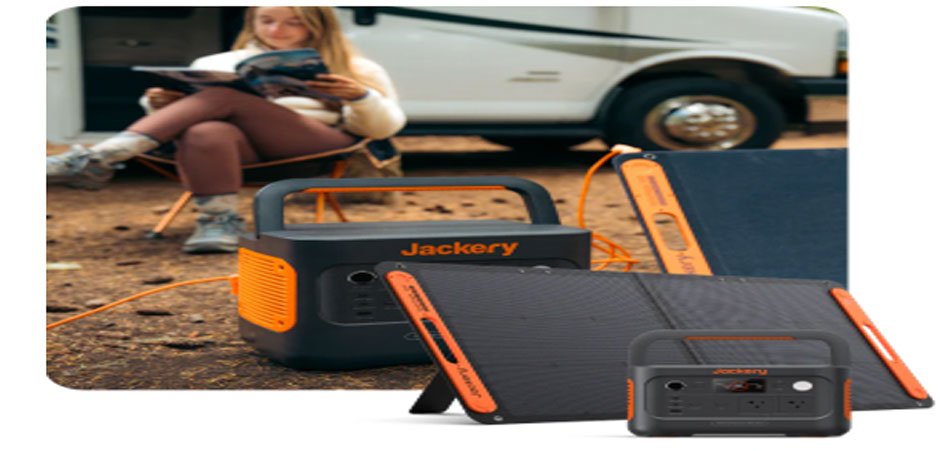
The Jackery Explorer 5000 Plus is one such solar generator for RV travel, built to deliver reliable energy no matter how remote you go. It provides 5040Wh capacity with a maximum 7.2kW output, capable of running essential devices for several days. It can easily power your lights, laptops, fridge and handle bigger appliances like a water pump or air conditioner. Charging is seriously fast, too. Using the Smart Transfer Switch, the Jackery Explorer 5000 Plus can be fully charged in approximately 1.7 hours, while standard AC charging takes about 3.5 hours. With support for both 120V and 240V outlets, it gives you flexibility whether you need to power small gadgets or larger appliances. And its multiple charging options—AC, high-voltage PV (up to 4000W), and low-voltage PV (1200W)—ensure you can recharge wherever you stop.
Durability also matters on the road. Thanks to its next-gen LiFePO4 battery rated for 4,000 cycles at 70%+ capacity, this solar powered generator is made to last. It is also compact, silent at only 30 dB, and highly portable due to the wheels and pull handle. The Smart Transfer Switch is CSA-certified, and smart app control allows precise monitoring and management of energy usage.
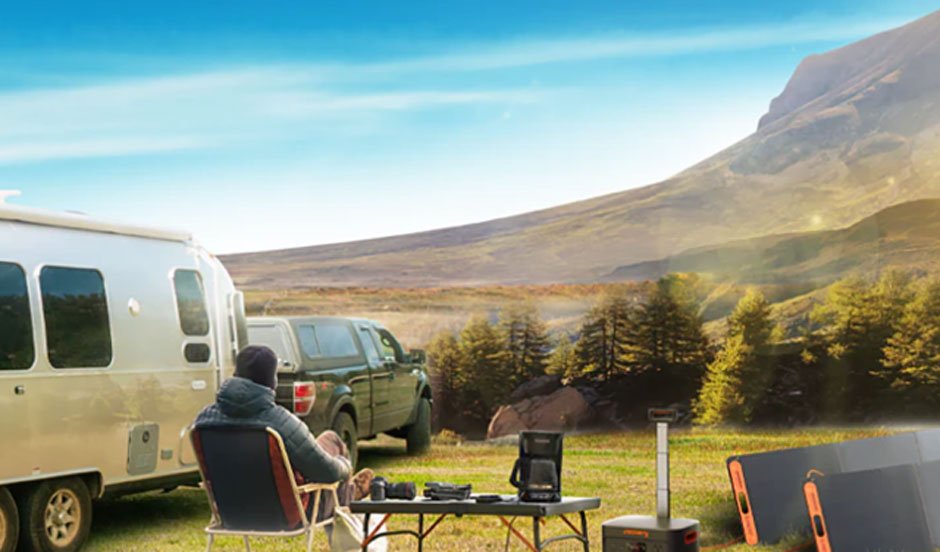
With a solar generator like this, you can go down the open road without worrying about rotten food, dead batteries, or freezing at night. Dependable power turns every scenic stop into a comfortable, connected, and unforgettable mini-adventure.
With reliable power at your side, you can pull over anywhere—by a quiet lake, on a mountain pass, or near the ocean—without worrying about the fridge shutting off or the lights going dark. Every stop becomes a small adventure, safe and comfortable from start to finish.
FAQs
When’s the best time to take an RV road trip in Canada?
Honestly, the best time runs from late Spring right through to early Fall. This is when you get the mildest weather—no one wants to deal with snow on their vacation! Almost every campground is open then, and the whole RV experience is just way easier and more fun.
The summer months, July and August, offer wonderfully long days. This gives you maximum time for exploring. But the fall? It’s simply stunning! The changing colours are absolutely gorgeous, especially if you’re headed out East. You can RV in the winter, but it’s a completely different trip. That’s a much harder job and demands serious, specialized cold-weather gear.
How do you find safe overnight stops while on the road?
A formal campground is always your safest bet. But RVers have a few other simple tricks for quick, one-night stops. We often pull into rest areas, some visitor centres, and sometimes the parking lots of big box stores like Walmart where they let you stay. The main rule is simple: always check the local signs first! You must be polite about private property. Also, pick a spot that feels safe and has good lighting. And hey, don’t be nervous—just ask a store manager if it’s okay to park for the night.
How do you stay powered and connected off-grid?
When you’re pulled over far away from those power hookups, you have a few choices. Some people use noisy, fuel-guzzling generators. A much cleaner, quieter way is using solar panels paired with a portable power station—the battery packs are reliable. That solar/battery setup is much more relaxing and better for the planet.
What about the internet? Lots of campgrounds offer Wi-Fi, but let’s be honest; it’s usually super slow. If you need to stream or actually get work done, most seasoned travelers rely on a mobile hotspot using a good Canadian SIM card. Just a big tip: your phone service will cut out once you drive into truly remote areas. Make sure you download all your maps, podcasts, and movies before you lose your signal!
What should I know about wildlife and outdoor safety?
Canada’s wilderness is amazing, but it’s home to bears, moose, and plenty of bugs. You have to be “bear smart.” This means storing all food securely in your RV, never in a tent. And never, ever feed the wildlife—it’s dangerous for them and you. Always carry bug spray, especially if you’re near a lake or heading up North. Finally, keep a safe, respectful distance from any animals you run into.
Conclusion
In short, an RV trip across Canada isn’t just a vacation; it’s the ultimate in DIY travel.
RVing means enjoying the comforts of home wherever you stop. But true RV freedom requires one more thing: Power. Make the Jackery Explorer 5000 Plus your first choice for cross-country adventures. With it, your power solution is as boundless as the open road. Picture a remote lakeside BBQ, a secluded forest campsite, and all the comforts of home. RV Road Trip Ready? This must-have portable power station is here to make sure your adventure stays comfortable, connected, and unforgettable. Your adventure is waiting!
